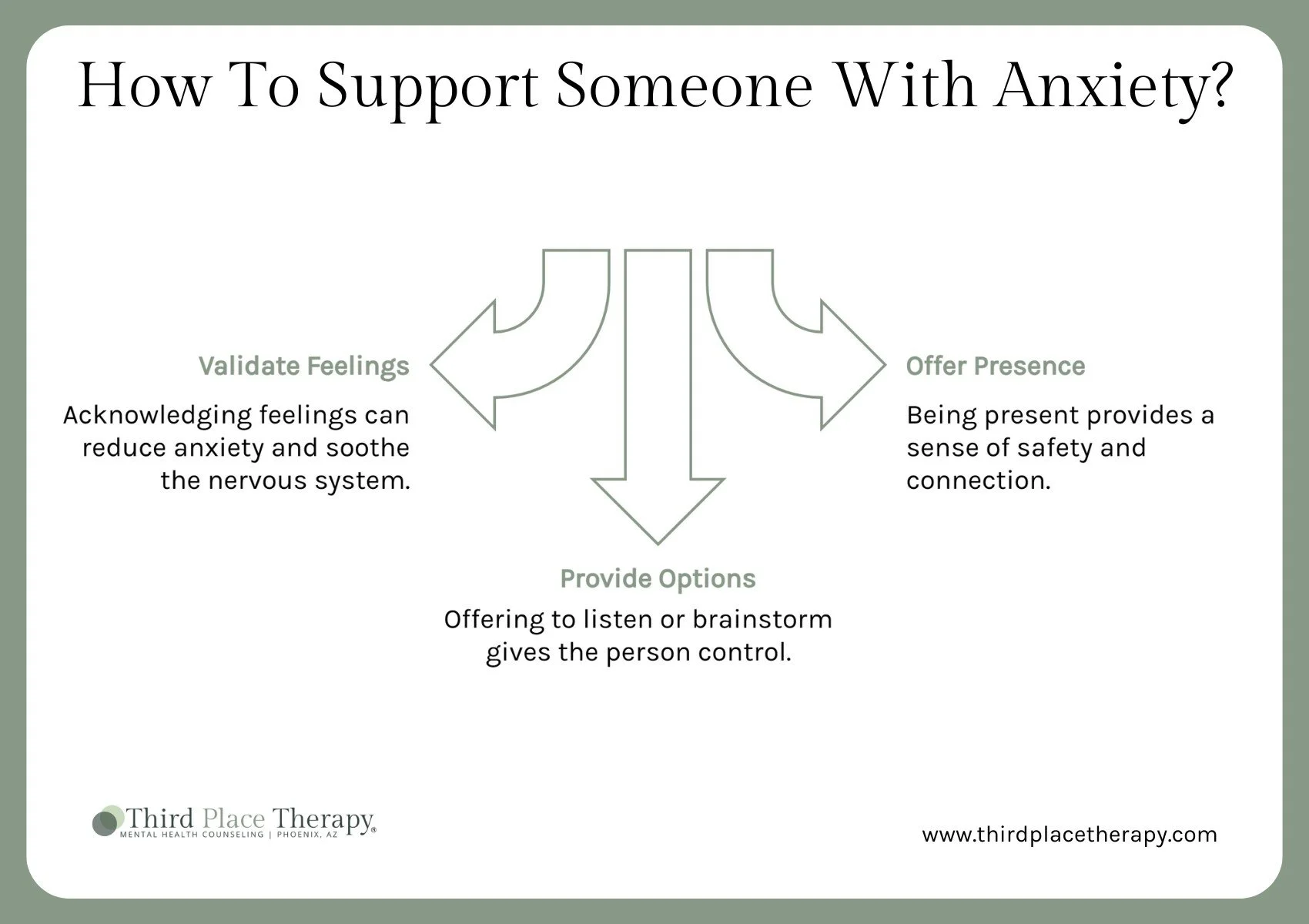How to Help Someone with Anxiety Without Trying to Fix Them
Watching someone you love struggle with anxiety can feel heartbreaking. You want to help, to make their panic attack stop, to ease the racing thoughts, but often, nothing you say seems to calm them down. That’s because anxiety isn’t something you can “fix.”
Your instinct to jump in comes from love and helplessness. You want them to feel safe. But true healing begins when we shift from trying to fix someone to simply being with them, offering understanding, patience, and presence.
In this article, you’ll learn:
What to say (and what not to say) to someone with anxiety
How anxiety interventions start with listening
When it’s time to seek professional help
If someone you care about is struggling, this guide will help you offer calm, grounded support.
Why Trying to Fix Anxiety Doesn’t Work
When someone you love is struggling with anxiety, it’s easy to slip into problem-solving mode. You might say things like, “Try to relax,” or “There’s nothing to worry about.” The intention is good; you want to help them feel better, but anxiety doesn’t respond to logic or pep talks. It’s not simply a mindset issue; it’s a full-body response.
Anxiety disorders, such as generalized anxiety disorder and panic disorder, as well as trauma and stressor-related disorders like post-traumatic stress disorder, involve both mental and physical symptoms, including rapid heartbeat, sweating, and dizziness. These reactions come from the nervous system’s built-in alarm designed to protect us from danger. For people with anxiety, that alarm goes off too often or too intensely, even when no real threat exists. That’s why “fixing” your loved one’s anxiety with advice can make them feel unseen or broken, rather than comforted.
The truth is, your presence can be more healing than your solutions. When you sit beside your friend or partner, breathe with them, and reassure your loved one that they’re safe, you’re already offering powerful emotional support. You don’t need to fix their symptoms of anxiety; you just need to stay present, patient, and kind as they learn to navigate their experience.
What to Say to Someone with Anxiety (and What Helps Most)
When someone you love feels anxious, it’s natural to want to say the “right thing.” But the truth is, it’s less about what you say and more about how you say it. People experiencing anxiety aren’t looking for a perfect script; they’re looking for calm, safety, and connection.
When your loved one feels anxious, try saying:
“That sounds really hard.”
“I’m here with you.”
“You’re not alone in this.”
“Would you like me to just listen, or would it help to brainstorm together?”
These simple phrases validate rather than fix. They acknowledge what your friend or partner is feeling, which research shows helps reduce anxiety and soothe the nervous system.
How Anxiety Interventions Begin with Listening
One of the most powerful anxiety interventions outside a therapist’s office is simple: listening without judgment. When you give someone space to express their fears, their body starts to regulate itself. This calm presence tells the brain, “I’m safe.”
Whether you’re supporting a friend, partner, or family member, your steady tone and patient energy can be more healing than advice. As the Substance Abuse and Mental Health Services Administration (SAMHSA) reminds us, consistent emotional support and peer support play a crucial role in helping people with mental health conditions recover. Sometimes the best way to help with anxiety is simply to slow down, stay curious, and listen with compassion.
What do you say to someone who has anxiety?
Start with empathy. Simple phrases like “That sounds really hard” or “I’m here with you” offer powerful emotional support.
What Not to Say to Someone with Anxiety
Phrases like “Just calm down” or “Don’t worry about it” may sound soothing, but they often leave people with anxiety disorders feeling dismissed or misunderstood. Anxiety affects both the mind and body, including racing thoughts, tense muscles, and rapid heartbeat, so it’s not something that can simply be “switched off.”
Here are a few common things not to say (and what to try instead):
What not to say:
“Just calm down.”
“Don’t worry about it.”
“You’re overreacting.”
“It’s not a big deal.”
What to say instead:
“It sounds like this feels really overwhelming right now.”
“I’m here with you.”
“Would it help to talk about it or just sit together for a bit?”
“That sounds really hard. You don’t have to face it alone.”
These simple shifts show understanding instead of dismissal. They tell your loved one that their experience matters, and that you’re a safe place to land.
And remember: your calm presence can be healing. When you take slow breaths, soften your tone, and stay grounded, you’re already offering powerful support. You don’t have to fix the anxiety; you just have to be steady enough to remind them they’re safe, seen, and not alone.
Boundaries and Self-Care: Supporting Without Absorbing
Supporting someone you love through anxiety can be both meaningful and draining. You want to help, but sometimes the constant worry, late-night talks, or emotional intensity start to take a toll.
Here are a few ways to support without absorbing:
1. Remember it’s okay to have limits.
Boundaries don’t mean you love them less; they mean you’re protecting your capacity to show up with compassion.
Check in with yourself before jumping in to help: Do I have the energy for this right now?
Give yourself permission to pause or step away when you need to recharge.
2. Take care of your own body and emotions.
Ground yourself before offering comfort; try a few slow breaths or a quick walk.
Talk to someone you trust or a therapist about what you’re feeling.
Make time for activities that restore you: journaling, reading, yoga, cooking, or time outdoors.
3. Know when it’s time to encourage professional help.
If your loved one’s anxiety symptoms are getting worse, like frequent panic attacks, withdrawal from daily activities, or signs of depression, it might be time to seek help from a mental health professional.
A therapist can help treat anxiety through evidence-based methods like EMDR and IFS.
And finally, shift from control to curiosity. Instead of “How do I fix this?”, try asking, “What might they need right now?” That simple change helps you stay grounded and supportive while allowing your loved one space to heal.
How can you calm anxiety fast?
Try grounding techniques: slow breathing, noticing five things around you, or relaxing your shoulders. Try these tips to help ease the body’s stress response.
When Anxiety Feels Bigger Than You: Encouraging Professional Help
Sometimes, no matter how much you listen or reassure, your loved one’s anxiety still feels too heavy to carry. You might start to wonder if what they’re experiencing goes beyond everyday stress. According to the National Institute of Mental Health (NIMH), nearly 1 in 5 adults in the U.S. live with an anxiety disorder, and many benefit from working with a mental health professional who can offer specialized tools and treatment and support.
It’s important to remember: suggesting therapy isn’t a sign of failure; it’s an act of care. Therapy, or talk therapy, can help people with anxiety understand their triggers, learn coping strategies, and calm the body’s stress response. If you’re unsure how to bring it up, try gentle, open-ended questions like:
“Have you ever talked to someone about how hard this feels?”
“Would it help if I helped you find a therapist or support group?”
“I care about you and want you to feel supported. Would you be open to trying therapy?”
Professional therapy provides what even the most loving partner or friend can’t: a safe, structured space for emotional processing, nervous system regulation, and trauma healing. A licensed mental health provider can help your loved one develop a personalized treatment plan and integrate management techniques.
Sometimes the best way to offer support is by helping your loved one seek help. You don’t need to fix everything; you just need to remind them that healing is possible and that experts can help them feel calm, connected, and whole again.
When is it time to seek professional help for anxiety?
It might be time to seek professional help for anxiety when it starts to interfere with your daily life, like your sleep, focus, relationships, or ability to enjoy things that used to feel easy.
Healing Starts When You Give Yourself Permission to Pause
At Third Place Therapy, support feels a little different; it’s not clinical or cold. It’s warm, relational, and rooted in evidence-based care that helps people gently understand what’s underneath their anxiety. Whether you or someone you know is feeling constantly on edge, experiencing signs of anxiety, or noticing how stress and anxiety are affecting physical health, therapy offers a safe, structured space to slow down and heal.
Our anxiety therapists use approaches like EMDR, Internal Family Systems, and mindfulness-based talk therapy to help clients ease anxiety, process trauma, and reconnect with their inner calm. It’s the same kind of compassionate space you try to create for your loved one, only guided by professionals who know how to help you regulate, rebuild, and find support that lasts.
If you or a loved one who may be struggling is ready to face their fears and find steady ground again, we’re here to help. Reach out!


